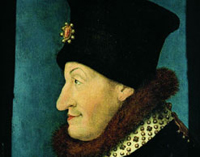Castles, Cannons and the Golden Rule
By Dominick L. Auci

Philip the Bold, Duke of Burgundy, was the fourth son of King John II of France. Most people nowadays don’t remember him because he lived a very long time ago, back in the 14th century. His older brother became King Charles V, but Philip’s real claim to fame may be that he married well. His wife, Margaret III, Countess of Flanders, was young, beautiful and fabulously wealthy. Although only 19 at the time, she was already on her second marriage. When her first husband died, Philip inherited her lands and liked the teenager well enough to marry her himself. Its pure speculation that the new fangled gunpowder weaponry, owned by Margaret’s father, had anything to do with Philip’s decision. But he married her anyway, and vastly accelerated the development of his father-in-law’s arsenal. Within a few years, Philip was boldly smashing down castle walls all over France and helping to establish the great Valois dynasty.
Interesting history, but why should anyone care about an obscure French prince, long dead? Because legend has it that Philip was the first person in history to use a cannon to knock down a castle wall, and that changed the world forever. Before Philip, castles were practically impenetrable. They had to be stormed, a bloody, usually futile business or besieged, a long and costly one, not much more effective than storming. So back in the day, whenever a hostile army approached, common people simply ran behind the castle walls, where they could hold out practically forever. As a result, the owner of the castle, the local Lord, controlled the population. Then there were the knights.
Knights guarded castles and amounted to professional ruffians on horseback. Armor protected both man and beast and made the knight the most formidable force on the medieval battlefield. Because they needed constant training and were very expensive to maintain, knights were usually relatives or favorites of the Lord. Castles and knights made it great fun to be a Lord, but impossible for anyone to become a strong King. A Lord in his castle, protected by his knights was practically invincible and therefore virtually independent. The situation supported the system of Feudalism for a thousand years. But the invention of the cannon made castles easy to take and knights became sitting ducks for any country bumpkin with a blunderbuss. Monarchs could finally consolidate their power and the modern system of nation states developed. All because Philip the Bold, Duke of Burgundy, some rich French guy who lived over five hundred years ago, was attracted to pretty teenaged girls and/or their father’s guns.
Ok, that’s definitely an oversimplification. But the lesson here is that new technologies can have surprisingly profound effects that change the very nature of human relations. Yes, new technologies are usually destabilizing. Printing presses, steam engines, railroads and machine guns all ushered in decades of instability and horrific violence. But the rather simple cannon, unlike those other inventions, did something much more. Like a thunder bolt, it reduced the aristocracy to mere landlords. Infantry replaced knights as trump on the battlefield and that development, in a scant hundred years or so, lead to freedom for millions of serfs. Now here's were the story gets really interesting and where knowing something about Russian history pays off; that’s what happened in the West, but not in the East. Serfdom persisted in Russia well into the 19th century. The difference was gold. Gold and silver bullion imported (some might say plundered) from the New World provided abundant currency for western Kings to hire the common folk and support huge standing armies. Little of that coin reached Russia, so Peter the Great and his heirs had to use terrible coercion to achieve the kind of absolute power necessary to build and defend the Russian Empire. This became a tradition, and with the help of the Orthodox Church (god bless it) kept Russia’s peasants bound to land for centuries after serfdom was abolished in the rest of Europe.
Forgive the long-winded history lesson, but here at last is the long-winded point: In the West, the cannon and an abundant currency facilitated a right relationship between labor and capital.
In Russia, inadequate money supply preserved aristocracy and a tradition of authoritarian control. The collapse of world’s financial system today isn’t due to bad loans, irresponsible borrowing or gluttonous consumption (although these things are damaging and unlovely). All that is symptomatic.
As in the past, the real culprits are rapid technological advancement, an inadequate monetary policy, an inversion of the right relationship between labor and capital and the failure of governments to foresee or correct the situation. Doomsayers predicting the decline of capitalism, the end of democracy (especially in Russia) and a new authoritarian age miss the point. Things may get ugly for a while, but Stalin, Hitler and Mao are the past, not the future.
What’s collapsing is not democracy or capitalism, but a predatory and unregulated perversion of it. In the first salvos of the modern class wars, global elitists cleverly used the Internet to transform the institutions of democracy and capitalism into casinos and to transfer (and hide) wealth at the speed of light.
They’ve gummed up the system badly and put by a deal of paper and serial numbers for themselves in the process. But gold can’t really travel through cyberspace. In the end, governments control currencies and in democracies, the people who vote control the government. In the next round, the elites will have the Internet turned against them. Monetary policy will right the relationship between labor and capital. And in the end, democracy, just as effectively as Philip’s cannons, will raze castles to the ground.
Dominick L. Auci, Ph.D.
Escondido, California.
Subscribe to Pravda.Ru Telegram channel, Facebook, RSS!





